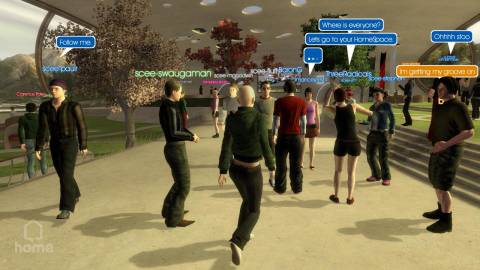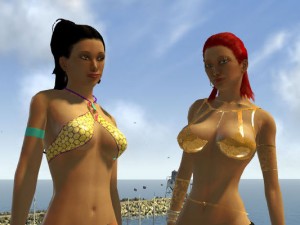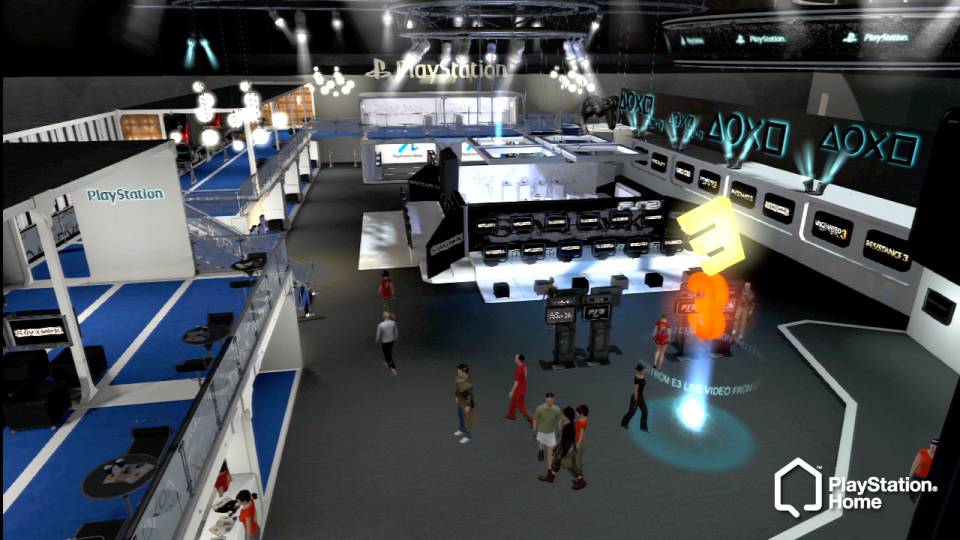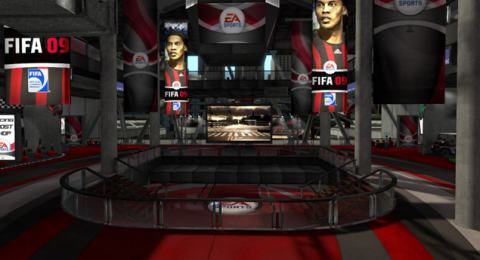
In case you'd forgotten, PlayStation Home still exists, and, yes, it's still in Beta.
Sony's ambitious virtual world may not have become the all-inclusive revelation proposed by Phil Harrison back in 2007, but it's still kicking. The service recently received its biggest back end update yet (version 1.5), and it's making money for Sony.
You might not love Home, but plenty of others do, and they truly do care.
I've been endlessly fascinated by Home. I published a series at G4 called "My Life in Home," where I hopped back in and tried to figure out the appeal, even if that appeal was lost on me. I researched those stories in January 2010, when I hadn't booted up Home since December 2008. Since then, Home has remained just a skipped over icon, finally changing last week.
Much has evolved in Home. It's faster, with plenty more places to go. I can't knock Sony's virtual E3 booth, either, even if it's pretty hokey, but that's coming from someone who's been attending E3 for over a decade. For someone who's never been, I'd imagine it's pretty neat. There's still an obnoxious amount of loading in Home, but some of that's been remedied by a new interface that appears before you actually launch into Home, allowing you to queue downloads for new rooms.
Much about Home hasn't changed, though. The art style is still...well, let's call it questionable. There are more items to mask your sort of real-looking face, but the general look of Home has remained. It's still a glorified chat room that just happens to have other things to do. Then again, I know plenty of people who treat World of Warcraft the same way. It's not inherently a bad thing.
I spent an hour on the phone last week with Sony's director of Home, Jack Buser, but you'll read that conversation tomorrow. Today, I'd like to introduce two people: Jason Sorensen, editor of HomeStation Magazine, and Tammy McDonald, CEO of a content creation company who pays the majority of its roughly 20 employee salaries by producing items, worlds and games for Home.
Each represents pillars of Home's success. They have little to do with whether you (or me) like it.
== TEASER ==
Where Everybody Knows Your Name (And PSN ID)
Sorensen is an editor, not unlike me. He just writes for a very different audience: Home users.
"Home is indeed a very misconstrued entity," said 31-year-old Sorensen, who goes by NorseGamer. "It has the interface of a video game and it's populated by video gamers who are used to the handholding of a video game, but it's not a video game, and the fan publication that I run is devoted to examining Home from a sociological perspective, rather than a gaming perspective."

A quick glance at the headlines for HomeStation Magazine prove out his point.
"Yes, Sex Sells — But At What Price?" is an examination of the sexualized expansion of clothing in Home.
"Home Athletes: Club VIP (Very Important Pixels)," highlighting a group within Home featuring purple and gold jacket-laden members, jackets that can only be earned by beating a certain number of Home-exclusive games. The latter was written by Burbie52, a 59-year-old member of Home and founder of the Grey Gamers, a group catering to Home's oldest crowd.
New issues of HomeStation Magazine are uploaded roughly once per month, but the website updates daily. If you want direct insight into the diversity of the Home community, here you go.
"There are some genuinely fascinating human stories in Home," said Sorensen. "People who meet in virtual reality, fall in love, relocate, marry and start new lives together. Quadriplegics who can walk. Deaf people who can communicate without any social stigma. Agoraphobics who can travel. Schizophrenics who need not worry about being shunned."
When I last checked in with Home, the experience reminded me of the a/s/l era of an Internet dominated by America Online. That was fine in my teenage years, but not something I'd like to return to. Then, I thought about my own Internet habits. I'm a frequent visitor of the NeoGAF message boards. And that's it. Outside of interacting with Giant Bomb's users, it's the only place I'd call my virtual home. Sometimes I don't care for it, but it's always one thing: familiar.
That's when I started to understand part of the appeal of Home. It's just a community that happens to exist on a game platform. The games part means much less than the people in it, their shared appreciation for games simply being the connection that brought them together.
"In real life, none of us would probably ever interact with each other," said Sorensen. "Yet we all find purpose, validation, relief or enjoyment in Home, and we work together as friends and colleagues."

Imagine what it's like when your favorite place on the Internet disappears. While it was a bummer that Mortal Kombat multiplayer didn't work during the PlayStation Network outage, it also meant the Home community suddenly found themselves without its primary means of communication.
"One thing that happened to every Home fansite is that visitor traffic numbers went up considerably," explained Sorensen. "The beating heart of Home isn't its gaming experiences--and it never will be. The true strength of Home, and where its long-term revenue generation opportunities are, lie in its ability to provide a social environment for people to interact and express themselves. The core community is quite resilient, and took to various fan websites to maintain those connections."
Sorensen's prediction that Home isn't about games is noteworthy, given Home's director told me there would be even more games coming to Home in the future, filling out the service. It reminds me of my original critique of Sony's approach to home during the series of articles at G4, where it seemed Sony's desire to court everyone basically ignored those who already got it.
HomeStation Magazine isn't the only dedicated magazine or community for Home users, but it does appear to be the most well-written. It probably helps the authors are mostly older.
Home, like other virtual services, gives people a place to be someone else, perhaps the person they'd like to be, rather than the person they are in the real-world. That's not the case for everyone, but viewed from that perspective, Home could seem extremely attractive.
"Thoreau once famously wrote that most people lead lives of quiet desperation and go to the grave with the song still in them," said Sorensen. "This is why social networking websites and virtual realities are so inherently addictive: because they give people a sense of significance and at the same time allow for tremendous creative expression and control over one's own self-portrayal."
For some people, that world is Second Life. For these people, it's Home.
Where There's Virtual Smoke and Virtual Fire, There's Real Money
Heavy Water wasn't called Heavy Water originally--it was Vision Scape Interactive in 1997. The company was a jack of all trades for-hire developer, working on over 100 different titles. Everything changed four years ago, when Electronic Arts approached Heavy Water about creating the EA Sports Complex space for Home. Heavy Water decided to take a gamble.

"Home was not up at the time and there were quite a few unknowns in the process," said Heavy Water CEO Tammy McDonald, "but my husband, Matt McDonald [CCO and president], saw Home as an opportunity to create a hybrid of content that spoke to our strengths and we could take advantage of our ability to use old-school development techniques to optimize content and tools."
EA Sports Complex launched in spring 2009, formally announced at CES the same year, sporting what you'd expect from a publisher-branded space in Home: trailers, mini-games, leaderboards. It was also a place for fans to hang out.
Right now, Heavy Water is one of the largest contributors of content for the Home platform, with much of its business now defined by Home. McDonald couldn't share specifics on what kind of money it's making off Home ("We make enough money to do what we love, and we love working in Home") or how profit sharing works with Sony ("We work within a variety of models with Sony, some is work for hire and others include a royalty share"), but it's clear Home is working out for it.
The company was employing more than 120 people in the San Diego area at one point, but that's down to about 20. The difference seems to be the impact outsourcing's had on the industry.
"We have an art team in India that we have been working with since 2003," explained McDonald, "so we can have as many as 100 additional artists/animators or as few as five, just depends on what our needs are at the time. It all comes down to planning."
Heavy Water most recently launched the second line in its "Heavy Ink" series, featuring tribal tattoos and full body looks modeled after classic pin-up girls aimed at "female fans of Home."
Even with such success, for the foreseeable future, Heavy Water doesn't expect to leave Home.
"Home is our core focus and our pipeline is set up around creating content, games and interactive experiences in Home," said McDonald. "Creating games for other platforms that do not have an obvious connection to what we are doing would be a distraction at this point."
When in Doubt, Just Click the Dance Button
Home isn't perfect, which I'd argue comes from the now-flawed premise it was based upon, compared to what the audience latched on to. Community Theater, something I'm flattered to learn was largely prompted from my last pieces on Home, was a step in the right direction, giving back to the people who fell in love for what Home was, not the "Game 3.0" it was "supposed" to be.
It's worth checking out how Home has changed, if you haven't. Chances are there's nothing that will shift your original opinion either way, but if you take the time to look, it's moving forward. If you already have a "home" on the Internet, though, there may not be much for Home to offer you.
As for how that Home might be changing, stay tuned for my conversation with Jack Buser, the authentically enthusiastic man at Sony spearheading Home. The man is a true believer.